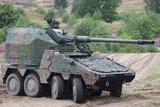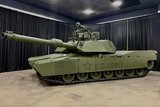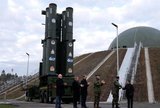General Atomics completes railgun and powder gun testing contract
General Atomics worked closely with the Navy’s Dahlgren Division, using equipment like this railgun. (Photo: US Navy)
General Atomics Electromagnetic Systems (GA-EMS) with the US Army and Navy have completed a major test series to advance the state-of-the-art in gun-launched defensive projectile interceptor designs.
Identical projectile designs were fired from a railgun at White Sands Missile Range in New Mexico and a powder gun at Dugway Proving Ground in Utah.
The projectiles reached record hypersonic velocities from the railgun launch and tested the projectiles' guided flight capabilities from both gun systems.
General Atomics delivered the projectiles with integrated gun-hardened guidance electronics to test their capability to sustain data links and control trajectory while the projectiles undergo intense G-Forces at hypersonic speeds.
The projectiles were developed to contain guidance electronics and control actuation systems.
During the test, the projectiles were launched using the Navy’s 32-megajoule railgun system and a 120mm powder gun.
Scott Forney, president of GA-EMS, commented that with these tests: ‘We have completed our contract to fabricate, deliver, and test prototype projectiles in railgun and powder gun environments’.
More from Land Warfare
-
![Early prototype of General Dynamics M1E3 main battle tank displayed at Detroit auto show]()
Early prototype of General Dynamics M1E3 main battle tank displayed at Detroit auto show
The first prototype M1E3 main battle tank was handed over to the US Army for testing and evaluation earlier this year, and now a pre-prototype has been unveiled. What have we learned from the vehicle first seen on 14 January?
-
![Bulgaria to receive first Strykers in February as part of force equipment refresh]()
Bulgaria to receive first Strykers in February as part of force equipment refresh
The delivery of the Stryker infantry fighting vehicles will form one piece of the country’s effort to re-equip its forces, which includes F-16 fighter jets and new air defence systems.
-
![Rheinmetall KF41 Lynx fighting vehicles set for first taste of combat in Ukraine]()
Rheinmetall KF41 Lynx fighting vehicles set for first taste of combat in Ukraine
A June 2024 agreement with Ukraine for Rheinmetall to provide 10 KF41s along with the establishment of a manufacturing facility in the country has moved a step closer, with the factory now built and a contract signed.
-
![Germany increases Arrow missile defence deal to $6.1 billion as American interest grows]()
Germany increases Arrow missile defence deal to $6.1 billion as American interest grows
Germany’s move to buy Israel Aerospace Industries’ Arrow missile defence system became public in mid-2023 with approval from the US government shortly after. The first operational system is expected to be in service before 2030.
-
![Sweden’s recent air defence spend tips to $6 billion with 2026 procurement planned]()
Sweden’s recent air defence spend tips to $6 billion with 2026 procurement planned
Procurement of various short-range systems will begin in the first quarter of 2026, with additional procurements to be made later in the year.

























